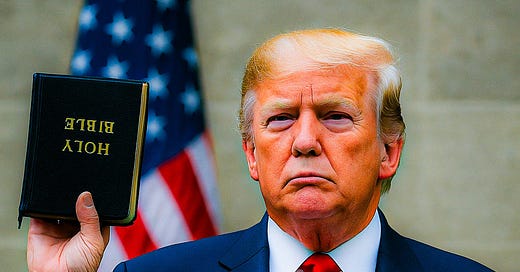Somewhere between Jesus of Nazareth urging his followers to love their enemies and Donald Dipshit Dump threatening to vaporize Tehran “for the glory of God,” a decisive theological bait-and-switch occurred. The modern American right didn’t kill Christianity, exactly—they just gave it a frontal lobotomy, handed it a flag, and taught it how to chant.
The key figure in this transformation is not Christ, nor Paul, nor even the televangelist with the best hair. It’s a long-dead Persian mystic named Mani, whose theology, Manichaeism, imagined the universe as a binary struggle between pure Light and utter Darkness. To him, there was no gray area—only cosmic trench warfare. Good versus Evil. Forever.
The early Christian Church, to its credit, labeled Mani a heretic. His ideas were too simplistic, too deterministic, too useful to the emotionally stunted. Naturally, America brought them back, shrink-wrapped them in patriotism, and gave them a tax exemption.
The Manichean God—not a figure you’ll find in the Nicene Creed, but central to the worldview of millions of American evangelicals today—is a deity of absolutes. He doesn’t ask for compassion or understanding. He asks for enemies. And in a country obsessed with moral clarity and allergic to nuance, that god sells better than salvation.
The groundwork for this theological regression was laid not in ancient Antioch or Jerusalem, but in Princeton, New Jersey, in the late nineteenth century, where theologians B.B. Warfield and A.A. Hodge invented a defense mechanism known as “biblical inerrancy.” Their premise: the Bible was not just divinely inspired, but incapable of being wrong, in any subject—be it geology, zoology, or geopolitical forecasts involving Babylon.
This wasn’t theology. It was doctrinal panic, a response to Darwin, German higher criticism, and the creeping suspicion that God might not have ghostwritten the entire Book of Numbers. But once the notion of inerrancy was unleashed, the toothpaste refused to return to the scroll.
Sidebar: The Bible’s Worst Nightmare—And Most Honest Mirror
On C. Dennis McKinsey’s Encyclopedia of Biblical ErrancyIf the Bible had a sworn nemesis with footnotes, it would be C. Dennis McKinsey’s The Encyclopedia of Biblical Errancy—a 600-page holy hand grenade lobbed directly at the heart of biblical inerrancy. McKinsey doesn’t merely question Scripture; he cross-examines it like a prosecuting attorney with receipts. Contradictions, scientific impossibilities, moral atrocities—they're all cataloged with the obsessive precision of a man denied Sunday school snacks.
To evangelicals, the book reads like heresy. To anyone tethered to reason, it reads like the long-overdue audit of a wildly mismanaged theological empire. McKinsey doesn’t care how sacred your cow is—he’s grilling it. This isn’t just a book. It’s a demolition manual for the idea that the Bible is infallible. If you want to understand why so many pastors fear critical thinking like it’s demon-possession, start here.
Required reading for anyone who’s ever been told God never makes mistakes.
Enter the Stewarts: Lyman and Milton, California oil barons and devout Presbyterians, who took this theological security blanket and turned it into mass-distributed ideological body armor. Between 1910 and 1915, they funded the publication of The Fundamentals, a twelve-volume doctrinal pamphlet that told Americans what to believe, who to hate, and how to spot a heretic in under thirty seconds.
Their target audience? Every pastor, church leader, and spiritually insecure layman across the country. Over three million copies were printed and shipped for free. As a public service. Sponsored by oil.
By the 1950s, America was deep into its Cold War psychosis, and the Manichean God reemerged with a vengeance—now rebranded as a bulwark against communism. In 1954, a coalition of Catholic lobbyists, evangelical conservatives, and God-fearing politicians inserted the phrase “under God” into the Pledge of Allegiance. Two years later, “In God We Trust” became the national motto. Not because God asked for it, but because Eisenhower’s pastor gave a particularly stirring Flag Day sermon.
It is important to understand that these additions were not spontaneous outpourings of national faith. They were cold-blooded branding decisions, the ecclesiastical equivalent of slapping a “Bless This House” sticker on a cruise missile.
The same men who funded churches also sat on the boards of oil companies and defense contractors. Their God was not the Prince of Peace. He was the CEO of the Culture War, a heavenly proxy for American exceptionalism with a boardroom in the sky.
At the epicenter of this faith-industrial complex was the Southern Baptist Convention, which in 1979 underwent what it called a “Conservative Resurgence,” and what historians may one day refer to as a denominational purge. The new leadership demanded unwavering allegiance to biblical inerrancy and rejected any theological nuance as the first whiff of sulfur.
Churches that failed to comply were cast out. Seminaries were cleaned out like heretical haunted houses. Thousands of ministers and professors left—or were driven out. In the space of two decades, America’s largest Protestant denomination became a rigid theocratic monoculture with the intellectual subtlety of a garden hoe.
And from this culture grew a new type of Christian: one trained not to seek truth, but to recognize enemies. Not to understand nuance, but to reject it categorically. The American evangelical base became a people in search of a strongman—a leader to embody the same binary theology that had dominated their pulpits for decades.
When Donald Dump arrived on the scene, they recognized him instantly. Not as a con man, not as a grifter, not as a philandering narcissist in a red tie—but as a vessel of providence. The Manichean God had found his earthly proxy.
Dump didn’t even need to fake piety. He barely pretended to know Scripture. His gospel was power. His parables were threats. His theology, if it could be called that, was violence in service of tribe. And the evangelical base gobbled it up like communion cake.
Here was a man who saw the world in the same sacred binaries they did:
America versus the world.
Christians versus the Left.
Israel versus the forces of darkness.
And so it is today, in 2025, that we find ourselves on the brink of war in the Middle East, with dumbshit American evangelicals rallying behind Israel—not out of love, but because their prophetic endgame demands bloodshed. Iran has retaliated. The region burns. And Dump, having installed himself as the unchallenged prophet of military might, mutters about glory and God as the missiles fly.
None of this would be possible without the theological dumbing-down that came before. The prosperity gospel, the MAGA hat prayers, the “Jesus was a capitalist” sermons—all of it rests on a foundation of weaponized Manichaeism, constructed brick-by-idiotic-brick by men who confused certainty with wisdom and dominance with righteousness.
God did not make America stupid. America just picked the stupidest God available and made him Lord of the land. The Manichean deity of the modern right isn’t there to be worshiped. He’s there to justify hating your enemies, sanctify your fears, and remind you that everyone who disagrees with you is literally Satan.
The result is a country that has forgotten how to think, how to feel, and how to doubt. A country where the line between theology and authoritarianism is not blurred—it’s erased. And a country where a deranged, doddering sex pest in an ill-fitting suit can con millions into believing he alone is good and everyone else deserves judgment.
God help us.
But not that God.
Not the one with the jets and the nukes and the biblical footnotes scribbled in Sharpie.
We need the God who weeps. Not the one who tweets.






